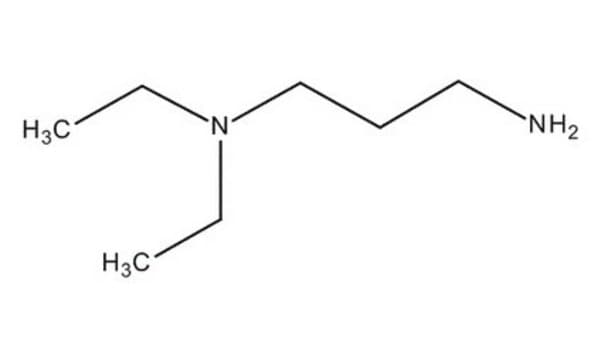8.03503
N,N-Dimethyltrimethylenediamine
for synthesis
Synonym(e):
N,N-Dimethyltrimethylenediamine, 3-Dimethylaminopropylamine, N,N-Dimethyl-1,3-propanediamine, N,N-Dimethyl-1,3-diaminopropane
About This Item
Empfohlene Produkte
Dampfdruck
17 hPa ( 30 °C)
Qualitätsniveau
Form
liquid
Selbstzündungstemp.
215 °C
Wirksamkeit
1640 mg/kg LD50, oral (Rat)
Expl.-Gr.
2.3-12.35 % (v/v)
pH-Wert
12.7 (20 °C, 100 g/L in H2O)
bp
132-140 °C/1013 hPa
mp (Schmelzpunkt)
<-50 °C
Übergangstemp.
flash point 32 °C
Dichte
0.82 g/cm3 at 20 °C
Lagertemp.
2-30°C
InChI
1S/C5H14N2/c1-7(2)5-3-4-6/h3-6H2,1-2H3
InChIKey
IUNMPGNGSSIWFP-UHFFFAOYSA-N
Anwendung
- Synthesis and Characterization of Ruthenium Metal Complexes of Polydentate Pyridine-based Ligands: Describes the behavior of platinum complexes with N,N-Dimethyltrimethylenediamine as ligands, focusing on their binding properties (D MAPOLELO et al., ResearchGate).
- New Water-Soluble Poly (propylene imine) Dendrimer Modified with 4-Sulfo-1, 8-naphthalimide Units: Discusses the acquisition of N,N-Dimethyltrimethylenediamine for use in dendrimer synthesis, contributing to enhanced sensing properties (AI Said et al., MDPI Sensors, 2023).
- Electrocatalytic hydrogen production and carbon dioxide conversion: Mentions the use of N,N-Dimethyltrimethylenediamine in preparing metal complexes for catalysis (S Sengupta et al., Polyhedron, 2020).
- Viscosities and deviations in viscosity of tert-butanol with various amines: Includes study on solutions of N,N-Dimethyltrimethylenediamine, exploring its effects on viscosity (FI Chowdhury et al., Journal of Molecular Liquids, 2014).
Signalwort
Danger
Gefahreneinstufungen
Acute Tox. 4 Dermal - Acute Tox. 4 Oral - Eye Dam. 1 - Flam. Liq. 3 - Skin Corr. 1B - Skin Sens. 1 - STOT SE 3
Zielorgane
Respiratory system
Lagerklassenschlüssel
3 - Flammable liquids
WGK
WGK 1
Flammpunkt (°F)
89.6 °F - closed cup
Flammpunkt (°C)
32 °C - closed cup
Analysenzertifikate (COA)
Suchen Sie nach Analysenzertifikate (COA), indem Sie die Lot-/Chargennummer des Produkts eingeben. Lot- und Chargennummern sind auf dem Produktetikett hinter den Wörtern ‘Lot’ oder ‘Batch’ (Lot oder Charge) zu finden.
Besitzen Sie dieses Produkt bereits?
In der Dokumentenbibliothek finden Sie die Dokumentation zu den Produkten, die Sie kürzlich erworben haben.
Unser Team von Wissenschaftlern verfügt über Erfahrung in allen Forschungsbereichen einschließlich Life Science, Materialwissenschaften, chemischer Synthese, Chromatographie, Analytik und vielen mehr..
Setzen Sie sich mit dem technischen Dienst in Verbindung.










